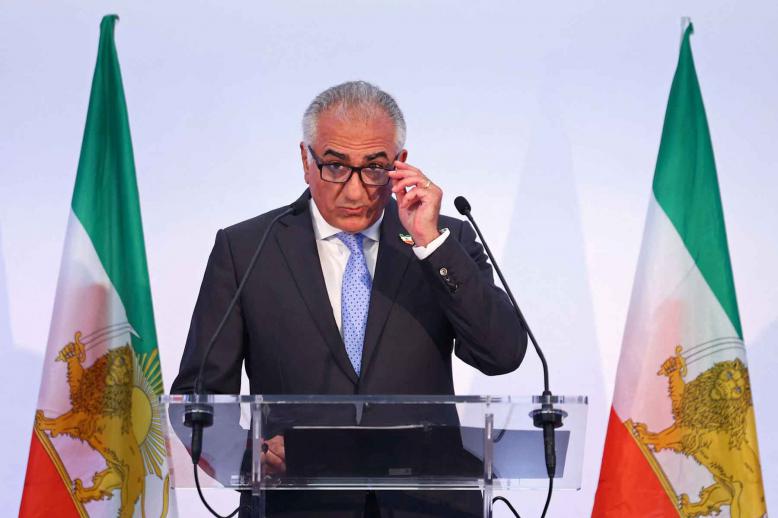Israeli candidates hope to mend ties with US Democrats
TEL AVIV - Israel's opposition leader Benny Gantz has said that if he becomes prime minister after the country's third national elections next month, he would work to mend ties with America's Democratic Party.
The former army chief of staff accused Prime Minister Benjamin Netanyahu of neglecting bipartisan ties in favor of exclusive support from President Donald Trump's Republican Party.
His comments came as Netanyahu's political rivals up their criticisms of his long tenure as Israeli leader ahead of elections on March 2, which will be the third time that Israelis head to the polls following two inconclusive elections in the past year.
Gantz and his running mate Yair Lapid addressed a crowd of around 1,000 mostly English speakers at an event late Monday in Tel Aviv. Lapid said that Israel faces the task of a “rehabilitation” of ties with the Democrats and with American Jewry in general.
Lapid said in an interview with The Jerusalem Post that he believed US-Israeli relations would be in “deep, deep trouble“ if Netanyahu were to regain his seat as Israeli PM.
“These are very angry Democrats. Israel used to be a bipartisan issue, it’s not anymore... It’s part of the prime minister’s job to make sure that Israel stays a bipartisan issue in the US, and to maintain the relationship with American Jews,“ Lapid said.
Netanyahu has heavily emphasized his relationship with Trump in the past year of electioneering, and has drawn criticism for alienating Democrats in the process. Both Gantz and Netanyahu have called for bipartisan support for Israel in the United States.
Gantz, who leads the Blue and White party, said it was “very important that we emphasize the importance of bipartisan relationship between Israel and the United States.”
“We don't care if the American president is a Republican or Democrat,” Gantz said. “If he is a good president for the United States," then that person would be a “good president for the state of Israel as well.”
Gantz is trying to unseat Netanyahu in the March 2 vote. Netanyahu, Israel's longest serving prime minister, seeks reelection while facing indictments on corruption charges. He has denied any wrongdoing. Pre-election polls indicate that neither Gantz nor Netanyahu has a clear path to a parliamentary majority.
Fraying relations
Netanyahu's close ties with the Trump administration, which counts pro-Israel US Evangelicals as a key support base, followed years of fraying relations with the current president's Democratic predecessor, Barack Obama.
Obama had sought to renew Washington's push for a peace deal between Palestine and Israel by inviting both parties to negotiate an agreement "based on the 1967 lines with mutually agreed swaps," in reference to the demarcation lines between Israel and a mooted Palestinian state that have been the basis of peace talks for decades.
An irked Netanyahu, who draws much of his support from Jewish settlers who call for Israeli annexation of Palestinian land, responded by lifting a freeze on settlement construction and rejecting the 1967 border lines as "indefensible".
A further deterioration in ties between Netanyahu and Obama followed. Netanyahu infuriated Obama when he accepted an invitation from then-House Speaker John Boehner, a Republican and a political rival of Obama's, to give a speech to the US Congress without consulting the White House. At the time, the move was decried as unconstitutional.
The speech was interpreted as an attempt by Netanyahu to demonstrate the strength of historic US-Israeli ties despite a US President who was seen as unconvinced by Israeli demands concerning the Palestinians. Netanyahu had also condemned the nuclear deal that world powers including the US reached with Iran in 2015, which he said would "pave the way" for Tehran to procure a nuclear weapon.
Ties continued to fray, culminating with the Obama administration, in its last year in power, refusing to veto a UN resolution demanding a halt to Israeli settlement projects in the illegally occupied Palestinian territories.
Surveys have suggested that support for Israel or Palestine in the US is becoming an increasingly partisan issue, although still leaning in favour of Israel for both Democrats and Republicans.
That position is in part informed by Democratic opposition to Obama's successor Trump, who has taken a uniquely partisan position on the Israeli-Palestinian conflict to the point that his Evangelical supporters have referred to him as the "King of Israel".
Trump also withdrew from the 2015 nuclear deal signed under Obama, restored sanctions on Iran and has taken a more aggressive foreign policy stance regarding Tehran and its threats towards Israel as well as other US allies in the region, including Saudi Arabia.
As the US itself gears up for an upcoming presidential election in 2020, Democratic candidates have been seen to embrace an increasingly progressive platform revealing the decline of what was once unquestionable support for Israel and its positions vis-a-vis the Palestinians.
The current Democratic frontrunner, Jewish candidate Bernie Sanders, has especially drawn support from Palestinians for saying that US mediation in the conflict should start treating Palestinians with "dignity and respect".






